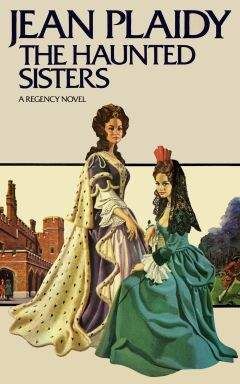Plaidy, Jean - Royal Sisters: The Story of the Daughters of James II
На электронном книжном портале my-library.info можно читать бесплатно книги онлайн без регистрации, в том числе Plaidy, Jean - Royal Sisters: The Story of the Daughters of James II. Жанр: Прочее издательство неизвестно, год 2004. В онлайн доступе вы получите полную версию книги с кратким содержанием для ознакомления, сможете читать аннотацию к книге (предисловие), увидеть рецензии тех, кто произведение уже прочитал и их экспертное мнение о прочитанном.
Кроме того, в библиотеке онлайн my-library.info вы найдете много новинок, которые заслуживают вашего внимания.

Plaidy, Jean - Royal Sisters: The Story of the Daughters of James II краткое содержание
Royal Sisters: The Story of the Daughters of James II читать онлайн бесплатно
The little boy’s health caused constant anxiety; although he was extremely intelligent his body did not keep pace with his mind and the members of his household who loved him were terrified that, like his brothers and sisters, he would not survive. But that one of Anne’s children should have lived four years was a triumph; Anne herself was continually fretting about his health and talked of it until, as Sarah complained to John, she nearly drove her mad.
The young Duke of Gloucester suffered from hydrocephalus and his head was out of proportion to the rest of his body so that it gave the impression that it was a great burden he had to carry around. He found difficulty in walking and had to be carried almost everywhere so that he was never without a retinue of nurses and attendants. Wherever he happened to be, his high young voice could be heard asking questions. Although only four, he wanted to hear about his uncle’s campaigns in Flanders and what the war was all about. His manner was that of an adult, and although those whose duty it was to look after him were anxious about his physical state they were extremely proud of his mental capabilities.
When he was taken into the parks, in his carriage, he would demand to stop when he saw a soldier and discuss his uniform, medals, and campaigns with him like a veteran.
The Duke of Gloucester was by no means the least picturesque member of the family.
Anne adored him; so did Mary. Even William had to turn away to hide a smile at some of the boy’s drolleries; and when he visited Campden House it was noticed that he would linger by the boy’s side and answer his questions with a patience, and amusement, that no one had ever seen him display before.
It was expected that this common interest in the young heir to the throne might bring the sisters together, but this did not happen. Mary had given Anne her ultimatum which was that she did not wish to see her until she rid herself of Lady Marlborough. Anne’s reply was to keep Lady Marlborough with her.
So the rift continued.
Each day the Duke of Gloucester was taken to Kensington Palace to see the Queen, for although his mother was forbidden the Court, this naturally did not apply to him.
He was interested in Kensington Palace where work was still going on, for he was always delighted to watch men at work, and if he could persuade them to let him have a tool so that he could join them, he was very happy.
Mary looked forward to his visits and was never with him without wishing that he were her son.
Mrs. Pack, the Quakeress, who had saved his life when he was a baby by feeding him at her breast, had remained with him in spite of Sarah Churchill’s endeavors to get rid of her. Anne had shown herself very stubborn on this point; she was clearly terrified that something would happen to Gloucester if the outspoken, somewhat domineering Quakeress departed. It was disturbing for Sarah to have someone with a temperament like her own near the Princess Anne, but she realized that it was something she had to accept. Moreover Mrs. Pack was attached to the little boy’s household in Campden Hill and therefore was not, as Sarah said, constantly under her nose to worry her.
Mrs. Pack rather naturally took as firm a dislike to Sarah as Sarah had to her; and with her plain good sense deplored the state of affairs in Anne’s household. She thought Anne a fool; her only redeeming characteristic being her love for her son. In the quarrel between the sisters Mrs. Pack sided with the Queen; and as a result carried to her any little piece of information which she thought might be important to Mary, who, recognizing the shrewdness of the woman, was very glad to have her spy in Gloucester’s household.
Mrs. Pack could tell the Queen when the Princess Anne was likely to be at Campden House which meant that Mary would not go at that time, thus avoiding an awkward meeting. But of course Mrs. Pack had other information to offer.
Anne often occupied her suite of rooms in Campden House, for she could not bear to be parted too long from her son, much to the disgust of Mrs. Pack who preferred to have the household to herself.
Gloucester was watched over with the utmost care. His food was sent from Berkeley House and knowing her own fancy for sweet things, Anne had banned confectionery, lest he develop too strong a taste for it.
Gloucester at the age of four was as intelligent as a seven-year-old; his quaint remarks were a delight to Mary, and when he called on her at Kensington Palace she enjoyed taking him around and showing him the men at work, for there were constant alterations and extensions being made at the Palace.
It was such a pleasure, in the midst of her anxieties, to spend an hour with the child. He always greeted her gravely, giving her the required homage and then having done his duty he would chat in a carefree way without a hint of shyness.
“How is my nephew today?” asked Mary.
“My dear Queen,” he answered, “I am taken too much care of. Did they take too much care of you when you were a child?”
“I don’t think they did,” replied Mary.
“You were lucky. ‘He mustn’t walk too much.’ As if I could? ‘He is getting over excited. He must be bled.’ Do you know there is a blister on the back of my neck?”
“No. Show me.”
He did.
“It is the doctors. They are always doing something to me.” He began to laugh. “They tried to fit me with a periwig. The blister was in the way.”
“So no periwig,” laughed Mary. “I think I like you better without.”
“Still, as heir to the throne I should have a periwig. I should like to be Prince of Wales. Why cannot I be?”
A difficult question. He knew nothing of his grandfather who had been driven from his throne, for all those about him had been forbidden to mention the matter. Why couldn’t he be Prince of Wales? How could one explain that in France there was a boy who was called the Prince of Wales. Not that he was accepted as such over here. But to give this boy the title would immediately give the Jacobites a fresh cause for complaint.
“You are young yet. All in good time.”
“Some people have been Prince of Wales when they are babies.”
“I think Duke of Gloucester a better title.”
“I don’t,” said the boy.
“Well, come and look at the men working on the masonry. You will be interested and I want to see how they are getting on.”
“It is good.”
“What?”
“To be a mason. I would like to be a mason.”
Mary smiled. Prince of Wales one moment, a mason the next.
“I think,” she said, “you enjoy these little jaunts to the Palace.”
“It is good to escape from them all. There is Lewis, my governess and her husband, and Mama as well as Pack. They are always there to see I do not tire myself, or if I need the leeches. Of course I wish I could walk better.”
“You will when you’re older.”
“There is so much to wait for. I wish I were older.”
“Most of us grow up too quickly.”
That was a point which made him pause to consider. Later he would inform someone that most of us grew up too quickly—that was as if he had convinced himself that it was so.
But when he watched the masons he was a child again, crying out with pleasure when one of the masons gave him a tool and showed him how to work with it. His big head on one side, an expression of deepest concentration on his face, he did as instructed and then turned to Mary, his eyes alight with triumph.
“I wish I were a mason,” he said.
“You are all wishes.”
“And you are not?”
She was silent and he went on: “But then you are the Queen. You can have everything you want so you don’t have to wish long.”
She looked at him wistfully and thought: If you were my son I should be very happy.
When she left him she told him that a surprise would be coming to him.
In a few days he received a set of exquisite ivory tools. They had cost twenty pounds, which was a large sum, but worth it, Mary thought, to give him pleasure.
He played with them for a few days; then he saw the soldiers when he was out on one of his trips in the carriage with Lewis Jenkins, his Welsh attendant. He insisted on stopping to watch them drill, and spoke to them.
Then he knew that more than anything on earth, more than a mason, more than Prince of Wales, he wanted to be a soldier.
There was consternation at Campden House. The Duke of Gloucester had whooping cough—not a serious complaint in itself, but when one considered the delicate state of health of the little boy every ailment struck terror into his family.
Anne, whose greatest quality was her devotion to her family, went to Campden House and stayed there. Sarah was with her. Mrs. Pack resented the intrusion into the nursery but could do nothing about it and silent enmity reigned between her and Sarah.
Mary was worried, but knowing Anne was in the nursery could not face the embarrassment of calling and coming face to face with her sister, who had so disobeyed her by keeping Sarah Marlborough and, moreover, had the woman with her at this time.
She therefore sent Lady Derby to inquire after the child’s health and to bring her back an account of how he was getting on.
“Go straight to Mrs. Pack,” said Mary. “She will give me a truthful account; and try not to have any conversation with either my sister or Lady Marlborough.”
Lady Derby, informing the servants that she came from the Queen, went straight to the nursery where Anne was seated in a room next to that in which Gloucester was sleeping. With her was Sarah.
Lady Derby walked past the Princess and Sarah into the nursery where she found Mrs. Pack, while Sarah and Anne exchanged glances before Sarah’s fury burst forth.
“You might have been a rocker, the way she behaved. You know whose doing this is!”
Anne nodded. “I know,” she said, “and I pray you, Sarah, say nothing to Lady Derby who but does what she is told. I care nothing for my sister’s attitude at this time. There is only one thing I pray for; and that is my boy’s recovery.”
Anne the mother had a dignity which she lacked in other roles. Sarah recognized it and, although it was a great strain, forced herself to be silent.
In the nursery, Lady Derby was questioning Mrs. Pack.
“He’ll get better,” Mrs. Pack assured her. “He’s over the worst. He wants to be a soldier, he told me today. He wants his own company and he does not want to wait till he is grown up. That’s a good sign.”
“I will tell Her Majesty and she will be pleased.”
“Tell her too that I am keeping that Churchill crow out of my nursery.”
“I will tell her,” Lady Derby promised.
When she walked out Anne and Sarah were sitting together, and they ignored each other.
Mrs. Pack was right; the Duke of Gloucester began to recover quickly.
To mark the occasion and because she had heard of his desire to be a soldier, Mary sent him a toy sword which was set with real jewels.
“If you will eat this,” Gloucester was told, “you shall be a soldier.” Gloucester would do anything to become a soldier—even eat the hideous potages that were put before him to build up his strength. “If you will wear this, you shall be a soldier.” He wore what they wanted him to.
He went out for rides in his carriage when he would have preferred to stay in, because a soldier must go out every day.
He was not one to allow these promises to go unfulfilled.
“Mama,” he said, “I was promised that I should be a soldier and it is not good to break promises.”
“My boy shall be a soldier when he is old enough.”
“Mama, he is five years old.”
“It is a little young to be a soldier.”
“Not when promises have been made.”
Anne consulted with George. “He will have his way,” she said fondly. “And we promised him to make him get well quickly.”
“We must get him a toy musket, cannon, and a uniform. That will please him.”
Anne smiled at George; no one could have had a kinder husband. He never interfered with what she wanted to do; they supped and drank together; he had taught her to like the same wines that he did; and the pleasures of the table delighted them both. There was no excitement to be had with George; for that one had to go to Sarah; but the fact remained that he was the kindest husband in the world and as devoted to their boy as she was.
The cannon, the musket, and uniform pleased the little boy, but he said: “I am the Duke of Gloucester and cannot be a soldier on my own. I need a company. I have to drill them and lead them into battle. I shall start recruiting immediately.”
The parents exchanged glances. This was an extraordinary child they had begotten. He was full of energy in spite of his physical weakness. What a King he would make when he grew strong!
Even they were surprised when they saw him drilling five or six boys in the gardens.
When they spoke to him about it he shook his head. “It is not enough,” he said. “I need many more for a company of soldiers. And I must have more uniforms and muskets and swords for them all, for they can’t be soldiers without.”
Naturally they wanted to please him; and it was so pleasant to see him well again. The Queen heard of the new project and muskets and cannons began to arrive. It seemed that to serve in the Duke of Gloucester’s army might be a good opening for many little boys. So it did not take the little Duke long to form his army and soon he had ninety boys to be drilled each day. He had his drummers and his pipers—all of the ages of six and seven, a little older than himself but he was old for his years.
This occupied his thoughts to such an extent that he could talk of little else. The people could come and watch him drilling his army and they laughed and cheered.
The most popular member of the royal family was the Duke of Gloucester.
Mary was forced to reign alone while William was on the Continent and both she and William greatly regretted that Shrewsbury was not in office.
William had taken the seals of the Secretary of State from Nottingham and offered them to Shrewsbury before he left, but Shrewsbury would not accept them. Shrewsbury was piqued because he supported the Bill for three-yearly parliaments which William was against for he sensed that this would curtail the royal prerogative. The Tories opposing the Bill in the Commons enabled the King to refuse his assent; thus it was thrown out. William, however, believed he and Mary needed Shrewsbury and while he offered him the office of Secretary of State he hinted at a Dukedom. Shrewsbury, ever ready to plead ill health, retired to the country, expressing indifference to the King’s offers.
William was harassed. His defeats on the Continent had depressed him; he had heard the rhymes about himself and Mary and the continual fear that he would be regarded merely as her consort—and which had been with him ever since their marriage, souring it and filling it with misunderstandings—returned.
Похожие книги на "Royal Sisters: The Story of the Daughters of James II", Plaidy
Plaidy читать все книги автора по порядку
Plaidy - все книги автора в одном месте читать по порядку полные версии на сайте онлайн библиотеки My-Library.Info.




